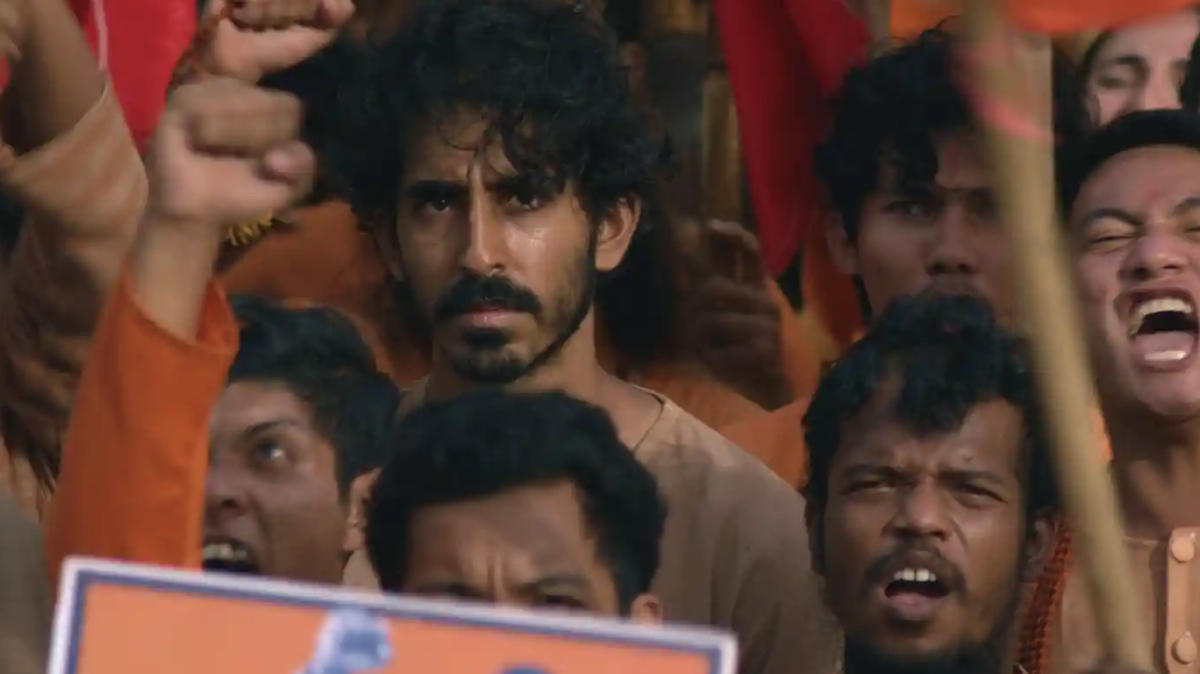Monkey Man, directed and starring Dev Patel, may initially appear as a John Wick-esque action-filled thriller, but what hides underneath is a pointed political commentary that pushes boundaries for the action genre.
Monkey Man follows Dev Patel as the unnamed main character simply credited as “Kid”, who seeks a path of vengeance against the corrupt political party leader and Chief of Police, Rana Singh, (eerily mirroring the Bharatiya Janata Party, BJP with its similar colors of saffron and oppressive leader), for killing his mother and destroying his village. Kid starts his journey as a wreckless fighter scrapping for cash in the ring, constantly getting beaten by his opponents. Eventually, Kid, through a work of swindling, finds himself able to attain a job in dishwashing that frequently houses the nationalist party. He eventually confronts the Chief of Police, but fails to inflict any lasting damage, while Kid sustains many injuries and is nearly arrested by the police. However, the Chief of Police begins to fear Kid, notifying the party leader, Baba Shakti, who tells him to end his life and suppress him because a small fire can burn everything down, alerting the audience of an oppressive regime that he tends to silence. Overall, the film seems not all that different from action-oriented films revolving around vengeance. However, what sets it apart from others is its willingness to criticize established norms and shine a light on what oppressed people face. Dev Patel reflects this willingness to tackle controversial subjects in an interview with Anthony D’Alessandro from Deadline, stating, “I think the action genre has sometimes been abused by the system. I wanted to give it real soul, real trauma, real pain … And I wanted to infuse it with a little bit of culture.”
After the altercation, Kid finds himself under the care of the Hinjra, a real life trans-fem community that assists Kid in finding his purpose, which he unlocks in a surreal, dreamlike state after he eats a fruit that accesses his repressed memories of his mother’s death. This also demonstrates a huge step for trans representation in Indian media. We flashback to his past, finally revealing how his mother died and his reason for his grudge against the Chief of Police, which is that he witnessed his mother being almost sexually assaulted, until he eventually choked her to death while the police burned down his village. This mirrors how the BJP and anti-Muslim rhetoric have destroyed countless Muslim Mosques and attempted to silence their voices, but also reveals corrupt law enforcement. This also offers an eerie parallel in 2002, a western Indian Village was burned to ashes killing 30 Indian-Muslims. There’s even a scene that shows a brief still of a poster reading “Save Indian Muslims”, along with several pieces of video footage of Indian women being abused, not shying away from the ugly side of Indian politics. Moreover, Amnesty International chair of Amnesty International India’s board, Aakar Patel, comments on the rising Muslim Indian violence: “It is alarming to note the impunity with which the Indian authorities have been enforcing their discriminatory de-facto policy of arbitrarily and punitively demolishing Muslim properties…”
After this dreamlike state, Patel eventually awakens his purpose on how he has to fight everyone in the underclass abused by the powers above, not only his mother. He eventually confronts the Chief of Police head-on and Baba Shakti, and with an invigorated purpose, he is finally able to kill them. Unfortunately, he eventually dies at the end of the movie after completing his mission.
Overall, this film creates a fiery critique of the Bharatiya Janata Party and reveals what oppressed minorities go through in India. It’s very outspoken on the corruption and horrors that take place in India, especially against oppressed communities, making it an amazing film that shows bravery and willingness to tackle the repression that these communities face.







